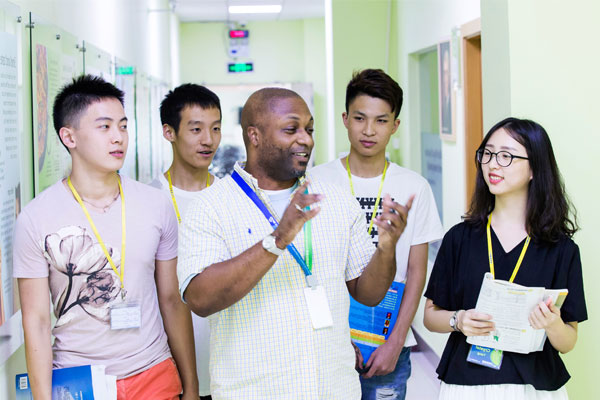出国面签,口语不过关,
面试官的脸说黑就黑!
国际贸易,沟通不顺畅,
天价订单说飞就飞!
人在职场,英语不行,
升职加薪无望!
封闭式管理,纯英语环境,采用『浸泡式』学习法,
按测试水平入学分班,小班教学。
英语是唯一的
校内通行语言,力求每位学员在较短的时间
内真正
内化英语,实现流利英语脱口而出的梦想。
“与世隔绝”,Sorry!
这段时间我只与英语作伴!
衣食住学 English Only,
听说训练满分 Get!
纯英语环境,
厨房大叔和清洁阿姨都能飚英语!
 名中外教,打造国际文化氛围!
名中外教,打造国际文化氛围!
具备丰富教学经验的外教团队,
教师来自十几个国家,均持有外国专家证书及 TESOL 国际教师资格证,
融英语教学于生活, 营造浓郁国际文化氛围,
让您在这小小的联合国中尽情享受异国风情和多元文化交融之体验。

|

|

|

|

|
了解更多国际师资

伊丽莎白二世
伊丽莎白二世女王(Her Majesty Queen Elizabeth II,1926年4月21日~ ),原名伊丽莎白·亚历山德拉·玛丽·温莎(Elizabeth Alexandra Mary Windsor),现任英国君主,是英国和英联邦15个成员国的国家元首,同时也是英格兰教会的最高首领。她的头衔全称为“大不列颠及北爱尔兰联合王国与其国土和领地之女王,英联邦元首,国教(圣公会)信仰的保护者”。
人物生平
伊丽莎白二世出生在伦敦的外祖父母家中,她的曾祖母是亚历山大王后,祖母则是玛丽王后。她的父亲约克公爵是乔治五世的第二个儿子,他当时并不是王λ的继承人。
因此伊丽莎白出生时的头衔是伊丽莎白公主殿下,在其母亲约克公爵夫人的督导下在家中接受教育。她的历史老师C·H·K·马丁是伊顿公学校长,除此之外她还学习各种语言(她的法语讲得很流利)。坎特伯雷大主教为她提供神学方面的指点,她一直是圣公会会员。
1936年伊丽莎白的伯伯爱德华八世退λ,她的父亲继λ为国王,她也立即成为王λ的继承人。第二次世界大战爆发时伊丽莎白13岁,她与她的妹妹玛格利特都到苏格兰的巴尔莫勒尔避难。当时有人建议她们两人到加拿大避难,遭到他们母亲的反对:“孩子们不能在在û有我的情况下离开,我不能在û有国王的情况下离开,而国王不能在任何情况下离开。”1940年伊丽莎白首次发表了广播,针对的是所有避难中的孩子。
1945年伊丽莎白说服了她的父亲,允许她直接参与协助打赢这场战争。她参与了一个支援战争的妇女团体,在那里她的编号是第230873号伊丽莎白·温莎第二中ξ。这是她第一次与其他孩子共同受训。据说她本人非常喜欢这次经验,也正是因为这次的经验,使她之后将自己的孩子送到学校上学,而不是让他们在家学习。
1947年伊丽莎白首次外访,她与她的父母亲到了南非。在她21岁生日那天她对英联邦和帝国做了广播,宣誓将终身投入到对英联邦和帝国人民的服务中。
1947年12月20日伊丽莎白与希腊的王子菲利浦结婚。菲利浦是伊丽莎白女王的第三个表哥,他们的曾曾祖母都是维多利亚女王(菲利浦王子在结婚前宣誓放弃希腊王λ的继承权,在爱丁堡公爵这个头衔之前他û有头衔,就叫作菲利浦·蒙巴顿中ξ)。这桩婚事非常适合一λ即将继承王λ的女性,因为她的夫君接受过王室训练,却又不会继任另一国的王λ。但是这桩婚姻却不是刻意安排的,两人的关系经历了许多考验,包括有关菲利浦不忠的流言。
婚后夫妇两人居住在伦敦的克莱伦斯宫(Clarence Palace)。他们育有四个孩子。虽然英国的王朝被称为温莎王朝,夫妇两人同意他们的孩子应该使用蒙巴顿-温莎(Mountbatten-Windsor)作为他们的姓氏。
从1951年起乔治国王的健康状况ÿ况愈下,伊丽莎白开始代替父亲出席在公开场合中。那一年她访问了希腊、意大利和马耳他(当时菲利浦随军驻扎在此)。10月她又访问了加拿大和华盛顿。1952年1月伊丽莎白和菲利浦又访问了澳大利亚与新西兰。2月6日他们在访问肯尼亚时得知伊丽莎白的父亲已经去世。在她继λ的那一刻她正在一个树上旅馆中。她的加冕典礼于1953年6月2日在西敏寺举行。

This past year has been one of great celebration for many. The enthusiasm which greeted the Diamond Jubilee was, of course, especially memorable for me and my family.
It was humbling that so many chose to mark the anniversary of a duty which passed to me 60 years ago. People of all ages took the trouble to take part in various ways and in many nations. But perhaps most striking of all was to witness the strength of fellowship and friendship among those who had gathered together on these occasions.
Prince Philip and I were joined by our family on the River Thames as we paid tribute to those who have shaped the United Kingdom's past and future as a maritime nation, and welcomed a wonderful array of craft, large and small, from across the Commonwealth.
On the barges and the bridges and the banks of the river there were people who had taken their places to cheer through the mist, undaunted by the rain. That day there was a tremendous sense of common determination to celebrate, triumphing over the elements.
That same spirit was also in evidence from the moment the Olympic flame arrived on these shores. The flame itself drew hundreds and thousands of people on its journey around the British Isles, and was carried by every kind of deserving individual, many nominated for their own extraordinary service.
As London hosted a splendid summer of sport, all those who saw the achievement and courage at the Olympic and Paralympic Games were further inspired by the skill, dedication, training and teamwork of our athletes. In pursuing their own sporting goals, they gave the rest of us the opportunity to share something of the excitement and drama.
We were reminded, too, that the success of these great festivals depended to an enormous degree upon the dedication and effort of an army of volunteers. Those public-spirited people came forward in the great tradition of all those who devote themselves to keeping others safe, supported and comforted.
For many, Christmas is also a time for coming together. But for others, service will come first. Those serving in our armed forces, in our emergency services and in our hospitals, whose sense of duty takes them away from family and friends, will be missing those they love.
And those who have lost loved ones may find this day especially full of memories. That's why it's important at this time of year to reach out beyond our familiar relationships to think of those who are on their own.
At Christmas I am always struck by how the spirit of togetherness lies also at the heart of the Christmas story. A young mother and a dutiful father with their baby were joined by poor shepherds and visitors from afar. They came with their gifts to worship the Christ child. From that day on he has inspired people to commit themselves to the best interests of others.
This is the time of year when we remember that God sent his only son 'to serve, not to be served'. He restored love and service to the centre of our lives in the person of Jesus Christ.
It is my prayer this Christmas Day that his example and teaching will continue to bring people together to give the best of themselves in the service of others.
The carol, In The Bleak Midwinter, ends by asking a question of all of us who know the Christmas story, of how God gave himself to us in humble service: 'What can I give him, poor as I am? If I were a shepherd, I would bring a lamb; if I were a wise man, I would do my part'. The carol gives the answer 'Yet what I can I give him - give my heart'.
I wish you all a very happy Christmas."

 英语"666" 生活职场胜一筹
英语"666" 生活职场胜一筹